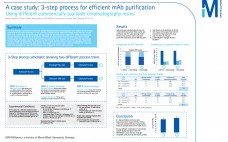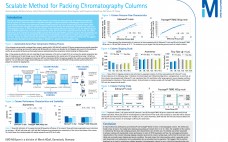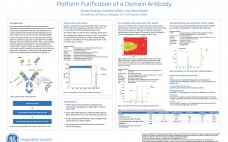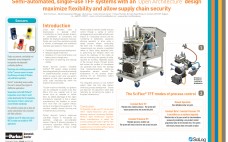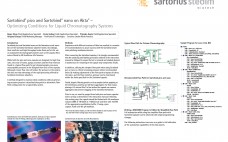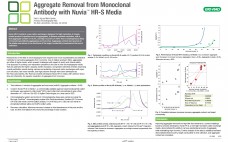A liquid-liquid porometry (LLP) test was developed to characterize the pore size distribution of Viresolve® Pro membrane. Data generated by this test supports the understanding of the size-based virus removal mechanism of the filter. The LLP test also is used at-line during membrane casting. Process control based on LLP results improves membrane consistency.
Downstream Processing
A Case Study: 3-step Process for Efficient mAb Purification
This study showcases a portfolio of commercially available biopharmaceutical chromatography resins designed for the efficient purification of monoclonal antibodies. A 3-step purification process has been implemented which showed effective removal of the main contaminants, low ligand leakage, and high yields over the entire process. Eshmuno® A affinity chromatography resin was evaluated as the first step in the process. The Protein A elution pool was further purified using cation exchange chromatography. Two cation exchange resins with different selectivities were compared. The…
Scalable Method for Packing Chromatography Columns
Currently the bio-pharmaceutical industry is heading towards cost cutting, time saving and single use manufacturing approach. This has opened up a whole new market for disposable technologies. Pre-packed disposable chromatography columns are a best fit for preclinical and clinical stage Monoclonal Antibody (mAb) production and vaccine manufacturing processes which require quick turnaround times and aggressive validation respectively. This work describes development of pre-packed and ready to use chromatography columns to meet this need in the industry. A robust packing method…
Platform Purification of a Domain Antibody
Monoclonal antibodies (MAbs) are very successful for treatment of several different cancers and tumors. However, the low tissue penetration has led to the development of smaller sized biopharmaceuticals (Ab fragments) such as Fabs, single chain Fv (scFv) and domain antibodies (Dabs). These molecules lack the Fc part of the antibody making a platform purification approach using Protein A impossible. However, with the introduction of the Protein L based affinity chromatography media (Captoâ„¢ L) new possibilities are introduced for capture of…
Progress On A Fully Disposable Downstream Platform: A Simple, Risk-Free, Plug-in Solution To Solve The DSP Bottleneck
Natrix HD Membrane technology features a polymeric hydrogel formed within a flexible porous support matrix. The support matrix provides mechanical strength, while the hydrogel properties determine the separation chemistry of the product. An advantage of the Natrix chemistry is the ability to place virtually any functional group chemistry throughout the hydrogel polymer. Natrix HD membrane technology combines the superior binding capacity of conventional resinbased columns with the high throughput of membranes in a single-use format that eliminates costly packing, cleaning,…
Semi-automated, Single-use TFF Systems With an ‘Open Architecture’ Design Maximize Flexibility and Allow Supply Chain Security
Cross flow filtration used in bioprocesses is typically either microfiltration to clarify process streams or ultrafiltration to concentrate and diafilter the biopharmaceutical molecule. Single-use cross flow operations provide a number of advantages over traditional stainless steel systems. These include: • Flexibility during process development • Reduced capital investment • Avoidance of cross contamination and faster product change overs • Elimination of steaming and cleaning utilities Parker domnick hunter’s innovative SciFlex® TFF system utilizes propriety technology allowing the sterile processing of…
Sartobind® pico and Sartobind® nano on Akta® – Optimizing Conditions for Liquid Chromatography Systems
Sartobind pico and Sartobind nano are the laboratory-scale mem-bers of the Sartobind membrane adsorber family. Accordingly, their small size and high throughput make them perfect for use on automated chromatography systems such as the popular Akta series offered by GE Healthcare Life Sciences.While both the pico and nano capsules are designed for high flow rates, the array of valves, pumps, monitors and the flow restrictor found in a typical flow path for gel chromatography can cause unacceptable pressures at the…
Aggregate Removal from Monoclonal Antibody with Nuvia™ HR-S Media
Nuvia HR-S media is a new cation exchanger designed for high resolution of closely related product impurities such as aggregates. It delivers excellent resolution, with a final aggregate content of <0.3%, and high recovery of >80% from a heterogeneous feed of monoclonal antibody aggregates and monomer. Aggregate content and recovery in the eluate were shown to be functions of the target conductivity measured at the end of collection.
Emerging Challenges to Protein A
Protein A affinity chromatography has been a target for replacement since its commercial debut, mainly because of its high acquisition cost. The technique became established despite the cost because it was born into an industrial culture that favored speed to market over manufacturing economy (1). Vendors have since strengthened protein A’s position with incremental but worthy improvements such as higher capacity, lower ligand leaching, and modest tolerance of NaOH. Collateral improvements in polishing technologies, such as the high throughput and…
Virus Risk Mitigation for Raw Materials
Recombinant protein–based medicinal products and modern cell-based vaccines have a very strong safety history with respect to viral and microbial contamination. However, virus contamination incidents do occur occasionally in manufacturing processes, and they can consume many resources and be expensive to rectify. The root cause of contamination incidents in recent years is most likely the use of contaminated raw materials. These include bovine serum contaminated with reovirus, epizootic hemorrhagic disease virus, Cache valley virus or vesivirus 2117; porcine trypsin contaminated…


